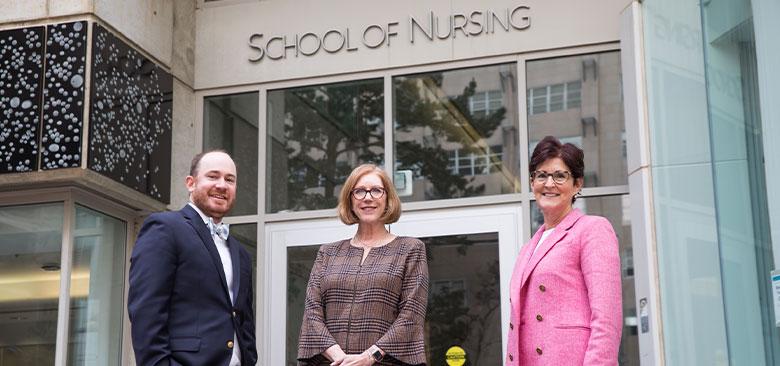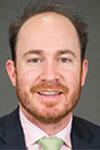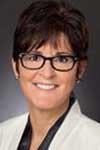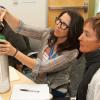
Justin Pohl, UCSF Leadership Institute director; KT Waxman, Doctor of Nursing Practice program director and Leadership Institute co-director; and Lisa Lommel, MS in Healthcare Administration and Interprofessional Leadership program director.
How UCSF is Developing More Nurses to Step Into Leadership Roles
As the health care industry continues to grapple with a national nursing shortage, there is a critical need for more nurses to assume leadership roles to help lead innovative solutions that will enhance patient care and build a more resilient workforce.
To address this need, the UCSF School of Nursing has launched the new UCSF Leadership Institute. One of only a handful such centers nationwide, the UCSF Leadership Institute provides leadership training to nurses and other health care professionals across the career spectrum, regionally and around the globe.
The new institute builds on existing degree programs at the School that prepare nurses to lead in their profession. Two programs — the Master of Science in Healthcare Administration and Interprofessional Leadership (MSHAIL) program and Doctor of Nursing Practice (DNP) program — specifically provide leadership development at the master’s and doctoral levels.
“Nurses who earn these degrees and go through our Leadership Institute are going to be able to quantify the value of nursing,” said KT Waxman, co-director of the Leadership Institute and director of the DNP program. “Our goals are to produce leaders who will enhance patient outcomes, increase quality, possibly avoid costs, and articulate those successes.”
Enhancing Leadership Skills
The Leadership Institute, which launched in 2021 and is a partnership between the School of Nursing and the UCSF Health Center for Nursing Excellence and Innovation, offers five signature leadership programs serving nurses and health care professionals across the career spectrum.
- The Transitioning into Leadership Program is tailored for clinicians and frontline health care professionals aspiring for a leadership role.
- The Foundations for Excellence in Health Care Leadership was designed for new health care managers, employees leading initiatives, or other health care professionals interested in enhancing their leadership capacity.
- The Academy for Health Care Leadership is geared toward experienced health care managers, directors or project leaders.
- The Healthcare Executive Leadership Program, which includes three multi-day immersion experiences in both San Francisco, California and Washington, D.C., is designed for senior, executive-level health care professionals.
- The Leadership Academy of the Advanced Practice Provider is specifically for physician associates, nurse practitioners, nurse midwives and certified registered nurse anesthetists, aimed at helping participants develop the awareness, knowledge and skills necessary to lead teams, transform health care and navigate an ever-changing landscape.
The programs, ranging six to nine months in length, provides working professionals the flexibility to continue their careers while pursuing leadership development. Within three of these programs, the institute also provides personalized executive coaching sessions.
 Justin Pohl “From excellent bedside nurse to the aspiring c-suite executive, we have a program intentionally designed to help nurses take the next step while improving their effectiveness in leading teams and organizations forward,” said Justin Pohl, the Leadership Institute’s director.
Justin Pohl “From excellent bedside nurse to the aspiring c-suite executive, we have a program intentionally designed to help nurses take the next step while improving their effectiveness in leading teams and organizations forward,” said Justin Pohl, the Leadership Institute’s director.
The institute has quickly built significant partnerships with health care organizations in the region, like Kaiser Permanente, and across the globe such as with the Min-Sheng General Hospital.
The Leadership Institute plans to offer 14 leadership development and specialty cohort programs next year and grow this to 28 programs in 2024. These initiatives will produce hundreds of nurse leaders annually to implement much-needed change in health care, said Pohl.
“Change management is present in all of our leadership initiatives,” Pohl said. “We teach and mentor across our programs with the expectation that participants will become coaches and mentors to help create that culture change within their respective health care organization.”
The Business Side of Nursing
The Leadership Institute works closely with the DNP and MS-HAIL programs, two of the School’s advanced degree programs in which emphasis is placed on preparing health care professionals to lead in the workplace.
For example, nurses who complete the MS-HAIL program can matriculate into the DNP program and the Leadership Institute to further hone their skills. Hours completed in the Leadership Institute may be transferred over to the DNP program for practicum credit. The scholarly project that is required of DNP students can be a leadership project.
Among the core skills that students learn in these programs is developing business savviness.
The DNP program currently offers the course “Organizational Systems and Healthcare Economics.” Waxman, who joined the School in December 2021, plans to introduce additional coursework to elevate the  KT Waxman financial literacy of students, as well as help create and lead a financial literacy workshop via the Leadership Institute this summer.
KT Waxman financial literacy of students, as well as help create and lead a financial literacy workshop via the Leadership Institute this summer.
“Business acumen is very important for leaders,” said Waxman, who holds an MBA and served in executive positions with Tenet Healthcare, a multinational health care services company.
“Oftentimes, APRNs, such as nurse practitioners are clinically focused so they don’t get a lot of this information. As nurse practitioners move into independent practice and running clinics, they need to be able to write budgets, analyze variance reports and run a business. As nurses, we need to be able to speak the language and build business cases for our needs.”
Emphasizing Interprofessional Communication
Along with improving financial management skills, developing communication skills, such as in delivering presentations and elevator speeches, will enable nurses to reach important audiences like policy makers.
“As nurses, we have to understand regulations and be able to talk to our legislators,” Waxman said. “Most legislators have no health care experience. We have the ability to advocate for change if the regulations are not working from a patient care perspective, by communicating clearly about what is needed.”
 Lisa Lommel In addition to training in leadership, economics and policy, among other areas, communicating effectively is at the heart of the MS-HAIL program, which welcomes clinical and non-clinical professionals dedicated to improving access, affordability, quality and safety in health care.
Lisa Lommel In addition to training in leadership, economics and policy, among other areas, communicating effectively is at the heart of the MS-HAIL program, which welcomes clinical and non-clinical professionals dedicated to improving access, affordability, quality and safety in health care.
“The MS-HAIL program has a strong, interprofessional focus and prepares our graduates to sit at the table with other professional and non-professional health care experts,” said Lisa Lommel, the program’s director. “We also provide one-on-one coaching sessions, which are one of the highlights for our students and really advances their leadership skills.”
Tara Christion, a registered nurse at UCSF’s Helen Diller Comprehensive Family Cancer Center, has fashioned a successful nursing career of more than 20 years, including supervisory experience. Christion’s aspiration to reach a director-level position to influence change brought her to the MS-HAIL program.
“The MS-HAIL program enhanced my leadership skills with knowledge on how to have difficult conversations, empathy, leverage team building, and how and when to delegate,” she said. “The program has given me the confidence to become the best leader I can be with the knowledge of emotional intelligence and becoming a leader.”



